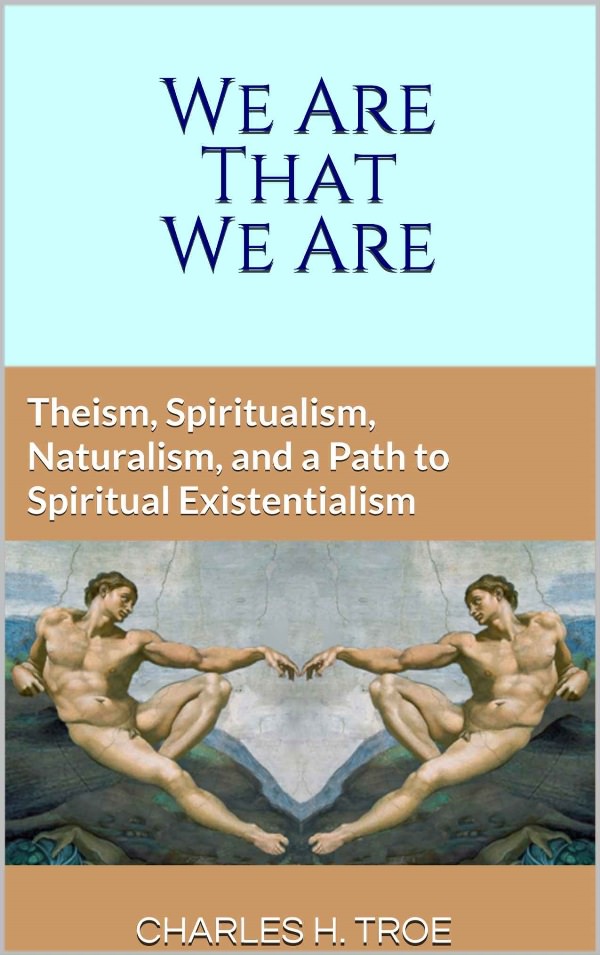Recovery in AA Need Not Be “Yahweh or the Highway”

By Charles Troe
Author of We Are That We Are
We Are That We Are, Theism, Spiritualism, Naturalism and a Path to Spiritual Existentialism is a largely autobiographical book. It is not, however, a story about my external experiences, events, accomplishments or life generally. It is an account of (1) how and why I have come to the conviction that there is no such thing as a supernatural god, (2) how I reconcile that conviction with the words of the Big Book, the testimony of my friends in AA and my own experiences that I still call spiritual; and (3) how I believe one can live life in accordance with spiritual and moral principles when none are prescribed by a supernatural god.
A few words from We Are That We Are:
… most of what theists… believe… if true, requires violations of the basic laws of physics.
I have come to believe that spiritual experience is analogous to our experience of time. Something real is happening but only in the macro human domain of applicability…. That does not mean that it is un-useful or unreal. In fact, it is very useful and, in a sense, real because it is part of human experience and perception – just like time. It is a “local” phenomenon that has no meaning in the universe as a whole but only among human beings.
So why spiritual existentialism? It decidedly is not because there is a definition of correct action or appropriate exercise of existential freedom that lies outside the province of human beings…. It is because there is something real, powerful, palpable and experiential that occurs within, between and among human beings that enriches the individual, the group and over time the species that is still mysterious, but for the existence of which there is ample room in a natural world that does not admit the possibility of a supernatural god.
Life can be every bit, even more, meaningful, fulfilling and wonderful without, as it would be with, the existence of a supernatural god.
It is my fervent wish that in my last fully conscious moment, which I hope is very shortly before my death, I will face life’s inevitable and complete end without fear, anger, guilt or regret, but with awe at the wonder of life, joy at having experienced it, sadness at its approaching end, and with love for those who were with me on this earth during our brief times of existence.
I owe all that is good in my life and my life itself to Alcoholics Anonymous. There can be no doubt that absent recovery from alcoholism by means of the AA program, I would have died in misery long ago. The only unknown is how many I would have killed, brought down with me or whose lives I would have damaged.
My “sobriety date” is August 1, 1979. I have been continuously sober and active in AA ever since. I mention this not because I think it makes me special or gives me authority. I believe that recognition that I am not special or unique has been a significant factor in getting and staying sober. Long-term sobriety provides a lot of useful experience but it does not confer authority over anything or anyone.
Over the years, by far the most common problem I have heard in or about the program is “the spiritual aspect”, the “god thing”, the “thinly disguised Christianity”, the “implied religious requirement,” or other formulations of that issue.
The Big Book is full of disclaimers of a particular religious point of view and exhortations that a reader consider only his own conception of god, a higher power and other spiritual terms. I think that any fair-minded person would agree that it is also full of unarticulated assumptions about the primacy of Christian beliefs and condescension towards non-believers.
The Big Book does not define god or higher power as a being, force or energy that transcends the laws of nature or that has characteristics of a monotheist god of the nature embraced by adherents of Christianity, Islam, or Judaism. However, it is obvious that such a god is what the writers of the Big Book had in mind when discussing that in which we must be willing to believe and upon which we must rely. I suspect that if they could be queried, they would say that the assumption that god is supernatural is unarticulated because it goes without saying.
The unambiguous dual requirements of honesty on the one hand and belief in and reliance upon god on the other, cause a head-on collision from which many never emerge or do so with great difficulty. How many times have I heard members of AA say “I know that I must find a concept of god but in the end, I simply do not believe in the sort of supernatural god or higher power that is effective for most of my fellow AA’s and certainly for those who wrote the Big Book.
Although I was raised in the Lutheran church, I found many Christian beliefs preposterous and moved on to agnosticism in my adolescence. Seemingly miraculous recovery from alcoholism, a profoundly different and better life and inexplicable spiritual experiences convinced me that some power (“god” for lack of a better word) was real. My concept of god or a higher power evolved over time, but for the first 38 years of sobriety, regardless of how abstract, loosely defined or ambiguous the concept, it always incorporated some aspect of a power unbound by the laws of nature. When therefore, I encountered logical, cogent, compelling and in the end irrefutable presentations of why a supernatural god does not and cannot exist, I faced a serious crossroads. I concluded that god does not exist and that I had been lazy and cowardly in formulating concepts that preserved an element of the supernatural.
I have written We Are That We Are to share my experience with others. It is not sufficient for me simply to announce that I am now an a-theist and describe how that belief system is consistent with “spiritual experience”, recovery in AA and a life lived in recognition of spiritual and moral principles. My objective is to relate in an understandable way the building blocks that led to my conclusion.
The book includes some basics on theism, atheism, agnosticism and existentialism (and some other philosophical isms), alcoholism and AA. There is material relating to my concept of god or a higher power as it existed for most of my sobriety. There are chapters on: Bayesian logic; the ancient Greek philosophy of physics; the loss of knowledge and suppression of science during the Dark Ages; the explosion of Western scientific inquiry and knowledge beginning in the 16th century; the science of physics including relativity, quantum mechanics and the Standard Model; emergent theories and domains of applicability; the nature of time, evolution and consciousness.
I find the arguments for naturalism indisputable. Acceptance of a reality that has no place for a supernatural god has profound implications. It requires reconciliation of an a-theistic understanding of the world with my very real experiences that I have called, and still call, spiritual. These are the issues addressed in two of the last three chapters of my book.
The last and longest chapter, on what I call Spiritual Existentialism, addresses concepts and principles that are inherent in an understanding of a reality in which human beings are neither created in the image of a supernatural god nor imbued with a divinely instilled nature, but that define their essence by their actions taken in the exercise of their free will.
In my opinion, (1) any alcoholic can recover in AA irrespective of having no belief whatsoever in a supernatural god; (2) non-belief in a supernatural god is not a precondition to having what are generally referred to as spiritual experiences which the Big Book states is the one thing all who have recovered in AA have in common; and (3) it is not necessary to believe in a supernatural god in order to live a sober life that is completely fulfilling and meaningful and that is based on moral principles, service to others and love of our fellows.


























Oh boy, am I looking forward to the whole book! Thank you, Charles!
In this essay, I particularly enjoyed the brief quotation regarding the end of life, and how a nontheist might regard it. It expresses my thoughts exactly. Looking at my birth certificate and at vital statistics, I know I’m coming around 3rd, and home plate is in sight (although I took the dogs for a milelong walk yesterday, and will drive a couple hundred miles safely today). I can’t accept that the Universe which has given me such a great experience as this life would suddenly turn stinky.
This midweek post from AA Agnostica is always a nice surprise. Thanks, Roger.
Let me know what you think.
Thank you, Roger.
What I particularly liked in this treatise was the observation that he had been lazy and cowardly for the first 38 years of his sobriety. I felt that was true of me also, though I’d never really said it that way. I was going along to get along and not really examining my thinking. And I was never so busy that I couldn’t have developed my thinking more accurately – I just did not want to take a chance on being shunned and so talked like others liked hearing me talk. Reading Mr Troe’s more honest self evaluation helps me also see my lazy and cowardly habits in AA.
Our convention in Santa Monica and the website aaagnostica have truly brought out a much better and more honest me.
Thank you for sharing a very good read.
This is great stuff. Its cogent and well reasoned. Wonderfully heady stuff. Nothing wrong with it at all. I truly wish there could be more discusion in AA mtgs along these lines. In addition here is a simple principle I rely heavily upon: “it’s not what you know but what you do” that is the key to sobriety and all forms of recovery and spirituality. It’s why the steps in all their various shapes, sizes and forms work. The principles behind them get all comers doing healthy, functional, responsible, and adaptive actions on the inside out.
Charles: Like you I am profoundly grateful for how AA involvement enabled me to find sobriety and stay sober in spite of the glaring religious implications.
The paragraph on spiritual existentialism was especially interesting to me. It is my journey through recovery that has taught me that I do have a spiritual component that I have to acknowledge and nourish just as I do my intellectual and physical components. I ran across an easy to understand and less “mysterious” definition of spirituality in a Hazelden pamphlet about 35 years ago: “Spirituality has to do with the quality of my relationship with whatever or whomever is important in my life.” (Paul Bjorklund). Or, as William Glasser would have said, “whatever or whomever I have freely chosen to occupy my quality world”. Quality personal relationships have enabled me to develop an inner spiritual strength I never had before. Based on what I observe when I’m around my granddaughter and her favorite horse, whether it is an endurance riding event or an equine therapy session, I’m not convinced spiritual experiences are restricted to we humans. But, I can’t interview the horse.
Thought provoking post! Thank you.